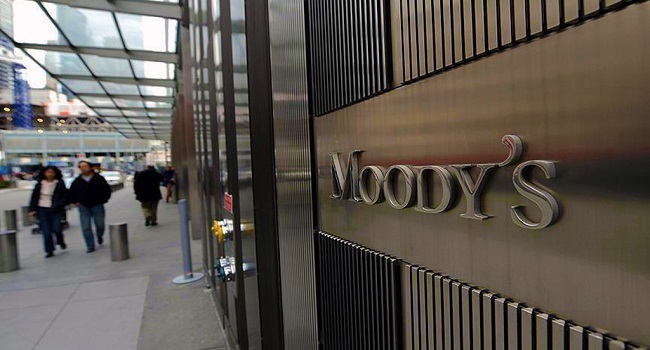Business
Moody’s explains why Nigeria’s credit rating is exposed to shocks

International rating agency, Moody’s has said Nigeria’s credit rating is being constrained by the sovereign balance sheet’s continued exposure to shocks because the government has not been able to expand its non-oil revenue base sufficiently.
Nigeria’s credit profile is currently at B2 stable.
In a report released on Tuesday, Moody’s said only a durable increase in Nigeria’s non-oil revenue will improve its resilience to oil price volatility and increase realization rates of capital spending on the large infrastructure projects that are crucial to its economic development.
“Until it does, the government’s balance sheet will behocks. Deficits will remain elevated and debt affordability challenged,” Moody’s Investor Service said.
Moody’s further explained that the sharp decline in oil prices from mid-2014 severely weakened Nigeria’s public finances as general government revenue halved to 5.6percent of GDP in 2016 from 10.5percent in 2014.
“Since late 2015, the authorities have stepped up their efforts to increase non-oil revenue,” Moody’s said.
“However, despite these efforts and even though oil prices have recovered to above the budgeted oil price, government revenue has mostly been below target and significantly below pre-crisis levels at around 6percent of GDP.
“Although oil revenue has risen in 2018, deficits remain elevated relative to revenue and debt affordability is still weak but improving,” said Aurélien Mali, a Moody’s Vice President – Senior Credit Officer and co-author of the report.
“We expect debt levels to remain contained at around 20% of GDP in 2019.”
According to Moody’s, Credit strengths include the large size of the economy and the country’s robust medium-term growth prospects, supported by strong domestic demand.
The economy has emerged from a 2016 recession, though real growth remains subdued. Higher oil prices and oil production of around 2 million barrels per day helped the economy to improve this year.
Moody’s forecasts economic growth of 1.9 percent of GDP this year, up from 0.8percent in 2017.
Read also: Non-oil sector pushes Nigeria’s GDP to 1.81 percent in Q3
Moody’s stated that the stable outlook on Nigeria’s sovereign rat-ing reflects the low likelihood of a shock that further impairs Nigeria’s economic and fiscal strength.
“External vulnerabilities have receded, supported by a rebound in oil prices and production.”
Moody’s further disclosed that structural institutional improvements and reforms that increase the diversification of government revenue away from oil would be positive for Nigeria’s credit profile. A sufficient increase in fiscal savings with the potential to offset a protracted economic shock would also be positive.
Downward pressure could emerge in the event of a prolonged slowdown in growth and investment, an extended deterioration in Nigeria’s fiscal position or further delays in implementing key structural reforms, particularly in the oil sector.
Join the conversation
Support Ripples Nigeria, hold up solutions journalism
Balanced, fearless journalism driven by data comes at huge financial costs.
As a media platform, we hold leadership accountable and will not trade the right to press freedom and free speech for a piece of cake.
If you like what we do, and are ready to uphold solutions journalism, kindly donate to the Ripples Nigeria cause.
Your support would help to ensure that citizens and institutions continue to have free access to credible and reliable information for societal development.
























